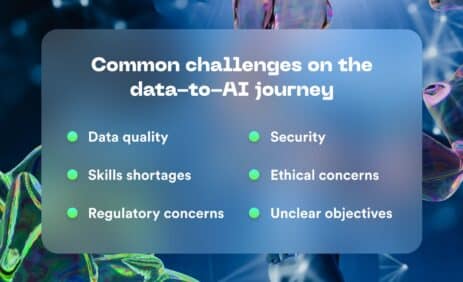For many organizations, artificial intelligence (AI) is the single biggest item on their 2024 agenda. But while companies are enthusiastic about leveraging AI’s potential, some lack the data foundation and culture to do so at scale.
Think of it this way: If AI adoption is the ultimate destination, data serves as both the road that paves the way forward and the map that guides the journey.
In this post, we explore how companies can adjust their enterprise culture to enable access to the consistent, accurate, timely data they need to effectively develop, deploy, operate, integrate and adapt AI applications at scale, enterprise-wide.
What do we mean by data culture?A data culture is one in which the organization:
|

Exploring the real-world value of a strong data culture
Perhaps the best way to illustrate the importance of a strong data culture in AI use cases is by examining what can happen when the organization relies on incomplete, outdated, or inaccurate data to make decisions.
Take, for example, a company that may be leveraging AI to streamline key aspects of the sales operations process in Salesforce.
In this case, a sales manager may be looking for information that will help them understand how to close existing opportunities based on past performance. They may issue a prompt similar to the following: Perform an analysis of closed opportunities won in the last quarter and suggest actions to increase the likelihood of winning more opportunities.
What the AI tool issues in response depends on the quality and completeness of the data it has access to in Salesforce.
| AI tool response in an organization with low data maturity | AI tool response in an organization with high data maturity |
Insights
Recommended actions
|
Insights
Recommended actions
|
From the above example, we can see several red flags in the low data maturity organization:
- Data is only available for won opportunities. Therefore, no insights can be derived from lost opportunities. This creates a huge blind spot for sales agents.
- 80% of opportunities were closed in a single day. This suggests that sales were entered into the CRM shortly before the opportunity was converted or even after the sale was made. This sets the unrealistic goal of achieving a single-day sales cycle.
- The available data suggests that 9 out of 10 opportunities can be converted by simply preparing an order for the customer. This leads the tool to recommend that this work be automated and that sales agents be redeployed to focus on other tasks.
Most people who have worked in a sales organization recognize that these numbers are highly suspicious—but the AI tool does not. It can only produce insights and recommendations using the data it can access.
The organization has inadvertently created significant gaps within the AI tool’s analysis capabilities by relying on an incomplete and misleading data set. This has, in turn, generated recommendations that will be counterproductive to the sales process, likely leading to a lower conversion rate than if the sales team had continued with the process without assistance from the AI tool.
On the other hand, by providing a more complete and accurate data set, the AI tool can produce several more concrete recommendations targeting customers at various points within the sales journey. The tool also suggests how the agent can leverage other AI tools to streamline or automate key tasks, thus helping capture warm leads and drive conversion.
Three steps for embracing a strong data culture
Step 1: Embrace an innovative mindset
Why: A culture that fosters innovation is essential for embracing AI and exploring new possibilities.
How: Encourage a mindset that values creative thinking and AI experimentation.
Step 2: Focus on continuous learning
Why: AI technologies evolve; a culture of continuous learning ensures the team stays updated.
How: Support ongoing training, workshops, and knowledge-sharing sessions about AI developments.
Step 3: Strive for ethical awareness
Why: AI introduces ethical considerations that must be actively monitored and addressed.
How: Foster discussions on ethical AI practices, establish guidelines and governance structures, and ensure team members understand the ethical implications of their work.
Supercharging your journey to a strong data culture with Globant
Addressing the fundamental challenges that are standing in the way of many companies’ AI goals involves implementing sound data management practices, verifying and validating data quality, identifying and correcting biases, and, when necessary, investing in data cleaning and enrichment. In addition, it is essential to maintain constant oversight of the data as it evolves to ensure that it remains accurate and relevant for AI analysis. In short, the company must commit to building a strong data culture.
With deep expertise in data and AI, as well as cultural transformation, Globant can be an invaluable partner for companies ready to face their data challenges. We leverage our unique Studio model, allowing our clients to tap the strategy, digital, and domain expertise they need to build data maturity and incorporate it across the enterprise. By combining these robust capabilities, we offer our clients an end-to-end solution that addresses data challenges and makes AI adoption a reality.
Helping clients build a strong data culture through our dedicated Studio teams
| Cultural Hacking | Data and AI | Salesforce |
| Powering cultural transformations to enable reinvention | Discover the real value of data and AI and activate your organization’s full potential with cutting-edge solutions | Unleash the power of data, AI, and Salesforce to revolutionize your business, ignite growth, and strengthen connections with customers, partners, and employees. |
| Learn more | Learn more | Learn more |
AI is a powerful tool, but its success depends on the data quality it relies on. With Globant, you can find a partner to navigate the path from data to AI intelligence with Salesforce and beyond—driving your innovation and fueling your reinvention.





